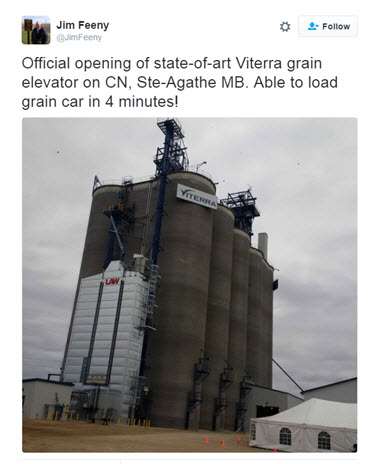Manitoba is home to a number of Viterra terminals
By Diego Flammini
Assistant Editor, North American Content
Farms.com
Viterra officially opened its new high throughput grain terminal in Ste. Agathe, Manitoba.
The facility, which joins many others situated throughout the province, has 30,000 tonnes of grain storage and can load 134 railcars. A loop track can connect to CN and BNSF railway lines.
"We're very pleased with this highly efficient facility and what it will mean to farmers, suppliers and other stakeholders in this province and in this community," Kyle Jeworski, Viterra president and CEO, said in a release. "We also recognize that any success we have as a company is directly attributed to our customers, who choose to trust us, to support us, and to provide us with the quality products we need to meet our end users' expectations worldwide."

Viterra's new grain terminal in Ste. Agathe, Manitoba.
Photo: Jim Feeny/Twitter
Jeworski said despite the company’s long history in the province, the new facility represents what the future has in store for Manitoba agriculture.
"While we're very proud of our history, we're also firmly focused on the future. Our significant investment in this new grain terminal demonstrates our confidence that southern Manitoba will continue to play an important role in Canadian and global agriculture for many more years to come."